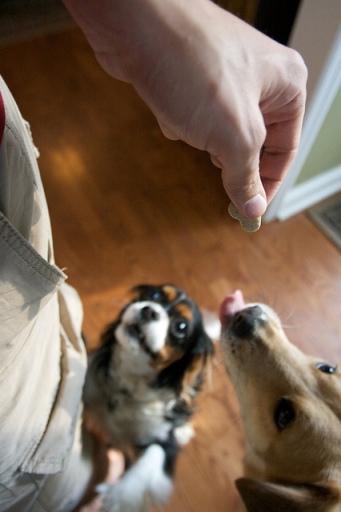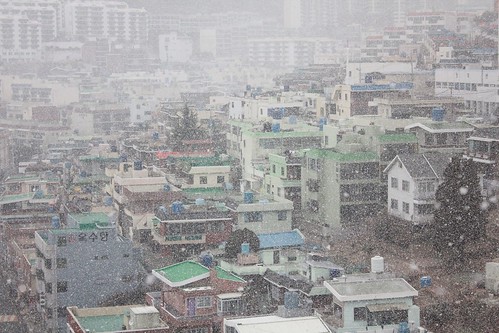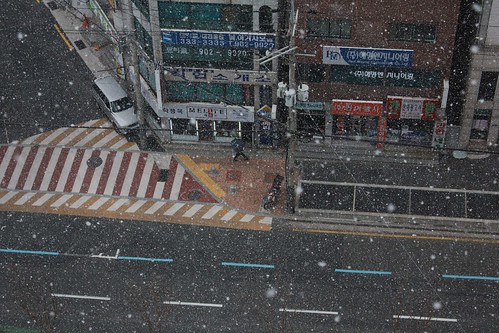And using manhwa (만화), or Korean cartoons, is a good place to start. Sadly, my favorite “grown-up” comic-book poptoon (팝툰) sold its last edition back in March, but there’s lot’s more where that came from.
One possibility is Department Head Dal-ma (Dalmagwajang; 달마과장), available in the free Focus newspaper. Although it’s often very basic, requiring no Korean ability to get the gist of, you could do much worse than quickly translating it on your morning commute.
Take these two strips for instance, which kept cropping up in Naver searches while I was preparing a recent post on sexual harassment in Korea. First, number 21:

Dal-ma: Gulp.
Man: Miss Kim, what did you have for lunch?
Miss Kim: I simply had ricecake at the park.
Even from just these first panels, already one thing of interest is that the man uses banmal (반말), or informal speech to speak to Miss Kim, and she replies in nopimmal (높임말), formal speech. No big deal there you might say: he’s probably her superior in the company. And as this recent incident on a subway demonstrated, using the appropriate level of speech to others is considered extremely important in Korea, with even many of my university students using nopimmal to friends just a few months older.
But then the same happens in the second cartoon too, even though the man addresses the woman with the semi-formal shi (씨) at the end of her name. And while a brief survey of other Dalmagwajang cartoons does occasionally show men and women each using nopimmal to each other, I didn’t see any cases of a woman speaking to a man in banmal and he answering in nopimmal. Which is not to say that they don’t exist necessarily, but if there are any then I’d wager there’d be very few.
If so, then is that just a reflection of reality? After all, women do tend to have junior and/or non-advancing positions in Korean workplaces, as even in 2011 it considered perfectly normal for them to resign and/or be fired upon marriage or becoming pregnant (only 50% of Korean women work, the lowest rate in the OECD).
 (Source: unknown)
(Source: unknown)
On the other hand, recall that even subtitles for foreign films and programs have this gender-dichotomy grafted onto them:
A women’s group has issued a report on the “sexist” dubbing of foreign films and dramas, reports women’s newspaper Ilda The group took a look at some 27 English-language dramas shown on terrestrial broadcasting in September and October. It found that most of them employed sexist sexist practices when dubbed into Korean. Namely, male characters spoke in banmal, or “low language,” while female characters used jondaenmal, or “high/respectful” language, even though the original English dialogue made no such distinctions.
This tendency was most often seen in dialogue between husbands and wives or lovers. Besides dramas, foreign films showed the same tendency, with 12 of 15 films monitored by the group employing this dubbing practice.
Clearly then, for TV at least there is a compulsion to conform to it. Whether that’s just the industry convention, fear of negative public reaction, and/or the personal choices of the translators themselves, then that remains to be seen, but I’d be surprised if that didn’t apply to some extent to other forms of media. Either way, you’re left with a pretty pervasive socialization agent, and one easy to overlook for English speakers, and/or even easier to get used to for native Korean speakers.

Man: Ah, why didn’t you invite me? I pound ricecakes really well…No, well, I eat them well…
Miss Kim: (Laughing) What do you mean?
Dal-ma: Even acting like that, he won’t get accused of sexual harassment?
Next, despite its curious reputation for conservatism overseas, in fact the Korean media is simply full of sexual innuendo, and this cartoon read by millions every weekday is surely a classic case in point: “떡을 치다” is literally “pounding rice cake”, but is really slang for having sex. Which is why a year ago, a cartoonist was sued for sexual harassment by Girls’ Generation’s (소녀시대) management company SM Entertainment for this otherwise innocuous-looking cartoon:
This might sound strange, but personally I find that slang quite endearing. For not only does it seem quintessentially Korean (here’s another example), but with most Koreans living in the countryside until as recently as 1979, then it reminds me of the country’s strong agricultural roots too (no pun intended).
Ahem. Continuing:

Dal-ma: Still, if something is judged sexual harassment or not all depends on your face (how attractive you look)
Woman left: He really said that?
Woman middle: (Laughing) Really?
Dal-ma: Wow! Look at her chest!

Dal-ma: Jeez, how can’t they feel ashamed to wear clothes that emphasize their breasts like that…
Eek, I forgot! Staring is also sexual harassment.

Dal-ma: (Worried) For no reason, because of a misunderstanding I’d be called a bald pervert.
Woman: Eek! It’s sexual harassment!
Having a shaved head myself, then I couldn’t help but chuckle at the unnecessary mention of his baldness here, as if that somehow makes his perversion all the worse. But with shaved heads being best known as a symbol of “prison, protest, or penance” in Korea, then unfortunately those negative connotations aren’t likely to go away any time soon.

Woman: Sexual harassment!
Dal-ma: No, it’s not that…
Women in background: Bald pervert!
Dal-ma’s daughter: What’s wrong with Dad?
Dal-ma’s wife: He’s like that because working at the office is tiring.
Next, number 57 (the latest is number 327 by the way). Sorry for the poor image quality:

Woman (Eun-hee): Good morning!
Man: Good morning! Eun-hee, you bought new clothes?
Eun-hee: Yes, because it’s the end of the year I spent a lot on myself

Man: Wow, your back is a killer!
Eun-hee: Really?
Man: Yes, you’ve a perfect Honey-bottom!
Despite what the man says in a moment, that’s the first time I’ve heard the term ggooldongi, a combination of ggol (꿀; honey) and ongdongee (엉덩이; bottom). But I have heard (and written about) ggoolbokji (꿀벅지) that it comes from though, which, as Matt at Gusts of Popular Feeling explained:
…apparently means, according to this article and allkpop, ‘sweet-as-honey thighs’ or “alluring as-if they-were-coated-with-honey thighs”, though a more creative, if incorrect, translation would be ‘alluring thighs that spread like honey.’ Ahem.
And in particular:
…a ‘high school girl living in Cheonan’ posted a petition on the Ministry of Gender Equality’s website claiming that the word ‘honey thighs’ actually means ‘thighs that you want to smear honey all over and lick off’, and represented the sexual commodification of a female body part, was sexual harassment, “induced a feeling of sexual shame” and said its use should be banned. She was also irritated that such a ‘sexually derogatory word’ was used by the media and asked that it stop. According to allkpop, “Even Korean portal site Daum has requested people to refrain from using this controversial term…”
Hence Eun-hee’s justified reaction:

Eun-hee: Honey bottom?
Man: These days it’s popular. It means honey applied to a bottom…
Eun-hee: I’m going to the Human Resources Department to complain about your sexual harassment!
Man: Honestly, it was just a compliment, why…

Man: Well, I was just complimenting her on how well her clothes fit. Why’s she acting like that?
Dal-ma: It doesn’t matter what your intention is, it depends on how the other person receives it. If they feel uncomfortable, then it’s sexual harassment.
Man: In that case, if someone has a good body, how can we give them a compliment?

Dal-ma: If you intend to compliment a certain part of a person’s body, then do it precisely. Then, the other person will take it well.
Man: I don’t really understand.
Dal-ma: Watch me do it.

Dal-ma: Sung-mi, your pectoral muscles are amazing. And your Sternocostal joints and Sternocleidomastoid muscle are beautiful!
Sung-mi: Er…thank you.
Dal-ma: You see?
No, I didn’t find them funny either. What’s more, they give the impression that all it takes to deal with sexual harassment in Korean workplaces is a quick visit to the Human Resources Department, and consequently that male employees are very nervous about being accused of it. Unfortunately though, as this case at Samsung and these recent testimonies by victims demonstrate, the reality is anything but.
Why the discrepancy? That’s a good question, and it’s made me curious to see if its also found in other newspapers, and so on. Which is not bad for a couple of quick cartoons over my morning coffee, yes?
I did hope to end on a more positive note though!^^ So, to compensate, here’s a sneak preview of something genuinely fun that I’ll be writing about soon:

Enjoy!

Filed under:
Korean Media,
Korean Newspapers,
Manhwa,
Sexual Harassment Tagged:
Dalmagwajang,
달마과장,
만화,
성희롱,
이효리,
Lee Hyori 

































Recent comments